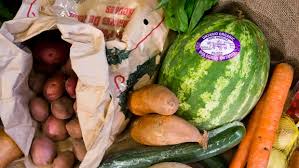For years I’ve told my five daughters the same thing: when someone says “trust me” walk – no run – away. Trust is earned.
 And there’s far too much faith-based food safety.
And there’s far too much faith-based food safety.
A judge on Friday sentenced the mastermind of the largest known organic food fraud scheme in U.S. history to 10 years in prison, saying he cheated thousands of customers into buying products they didn’t want.
Ryan Foley of Global News cited U.S. District Judge C.J. Williams as saying Randy Constant orchestrated a massive fraud that did “extreme and incalculable damage” to consumers and shook public confidence in the nation’s organic food industry.
Williams said that, between 2010 and 2017, consumers nationwide were fooled into paying extra to buy products ranging from eggs to steak that they believed were better for the environment and their own health. Instead, they unwittingly purchased food that relied on farming practices, including the use of chemical pesticides to grow crops, that they opposed.
“Thousands upon thousands of consumers paid for products they did not get and paid for products they did not want,” Williams said. “This has caused incalculable damage to the confidence the American public has in organic products.”
Williams said the scam harmed other organic farmers who were playing by the rules but could not compete with the low prices offered by Constant’s Iowa-based grain brokerage, and middlemen who unknowingly purchased and marketed tainted organic grain.
Williams ordered Constant, a 60-year-old farmer and former school board president from Chillicothe, Missouri, to serve 122 months in federal prison, as his wife and other relatives sobbed.
Earlier in the day, Williams gave shorter prison terms to three Overton, Nebraska, farmers whom Constant recruited to join the scheme. Williams described the three as largely law-abiding citizens, including one “legitimate war hero,” who succumbed to greed when Constant gave them the opportunity.
Michael Potter, 41, was ordered to serve 24 months behind bars; James Brennan, 41, was sentenced to 20 months; and his father, 71-year-old Tom Brennan, was given a three-month sentence. Williams said the shorter sentence for the elder Brennan reflected his heroism as a decorated platoon leader in the Vietnam War.
 All four farmers sentenced Friday had pleaded guilty to wire fraud charges and co-operated with a two-year investigation that isn’t over. A fifth farmer has also pleaded guilty in the case and is awaiting sentencing.
All four farmers sentenced Friday had pleaded guilty to wire fraud charges and co-operated with a two-year investigation that isn’t over. A fifth farmer has also pleaded guilty in the case and is awaiting sentencing.
The farmers grew traditional corn and soybeans, mixed them with a small amount of certified organic grains, and falsely marketed them all as certified organic by the U.S. Department of Agriculture. Most of the grains were sold as animal feed to companies that marketed organic meat and meat products.
The farmers reaped more than $120 million in proceeds from sales of the tainted grain. The scheme may have involved up to 7 per cent of organic corn grown in the U.S. in 2016 and 8 per cent of the organic soybeans, prosecutors said.
Assistant U.S. Attorney Jacob Schunk said that under the scheme, consumers paid at least $250 million for fraudulent organic products _ and perhaps $1 billion or more. He said that Constant for years exploited an organic certification system that relies on the honesty of farmers and private certifiers.
“He saw the weakness in the system and he exploited it over and over again,” Schunk said.
Constant said that he took full responsibility for his crime and he apologized to his family and the grain merchants, farmers, ranchers and consumers whom he ripped off.
“The organic industry in this country is built in trust and I violated that trust,” he said.








